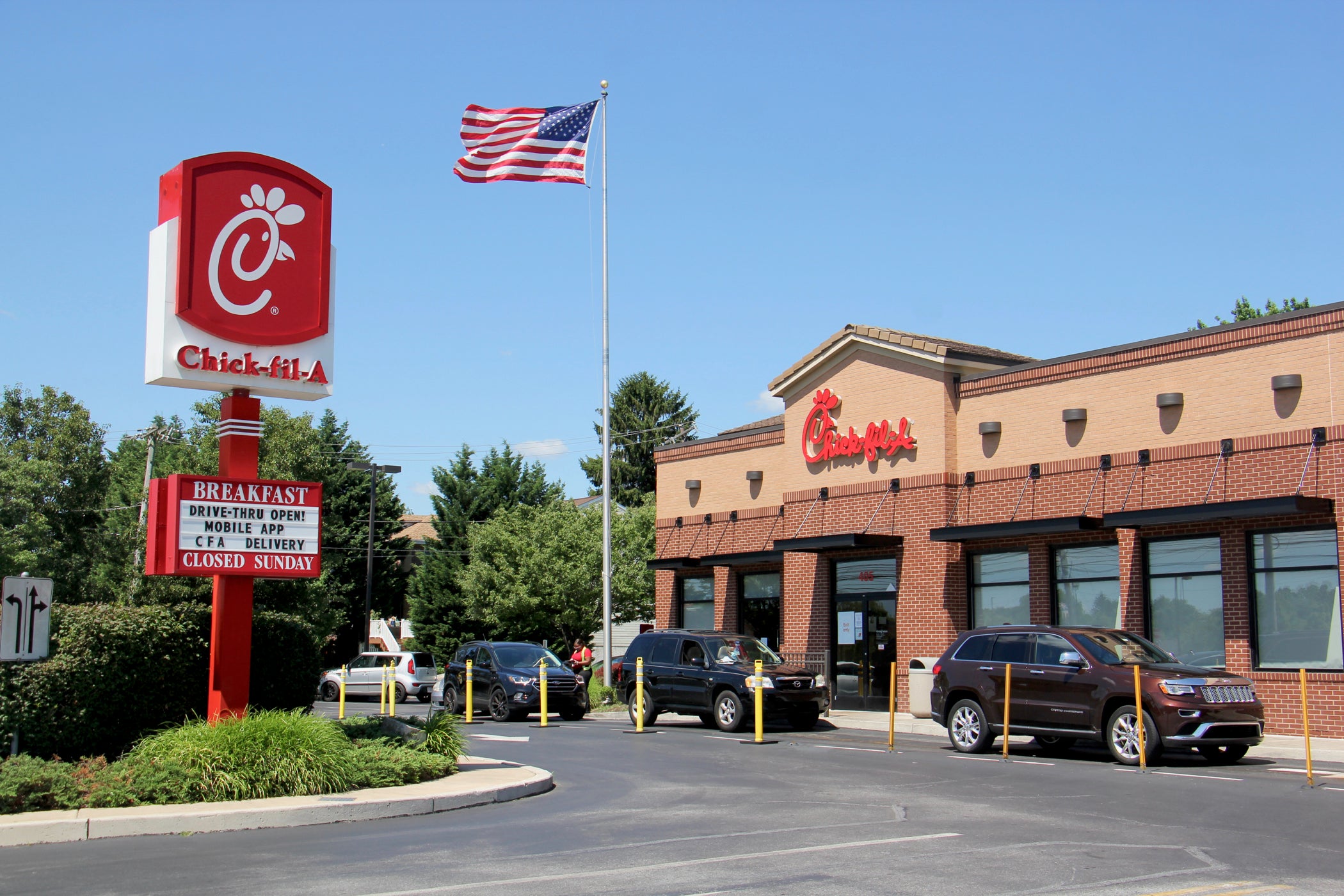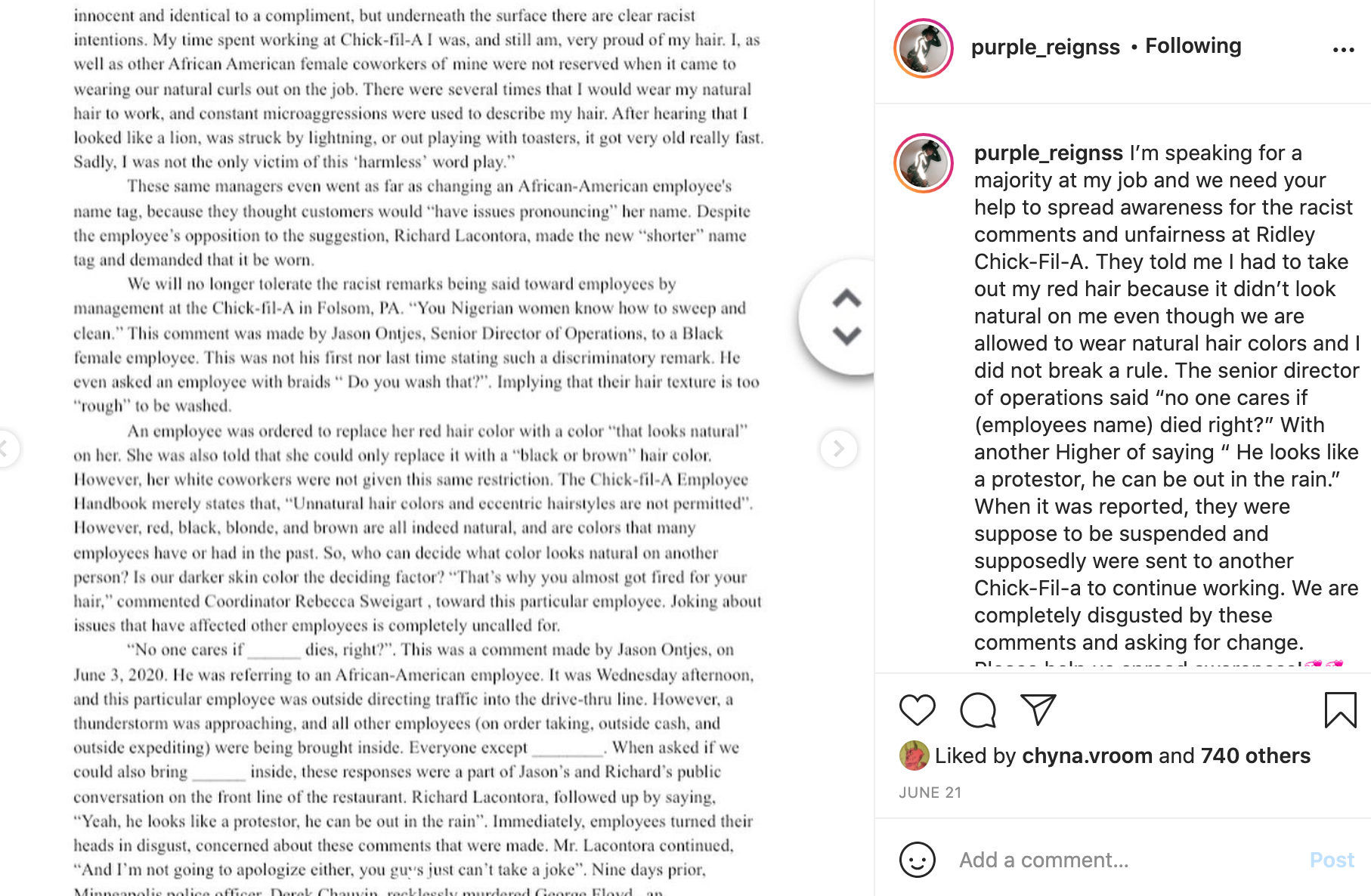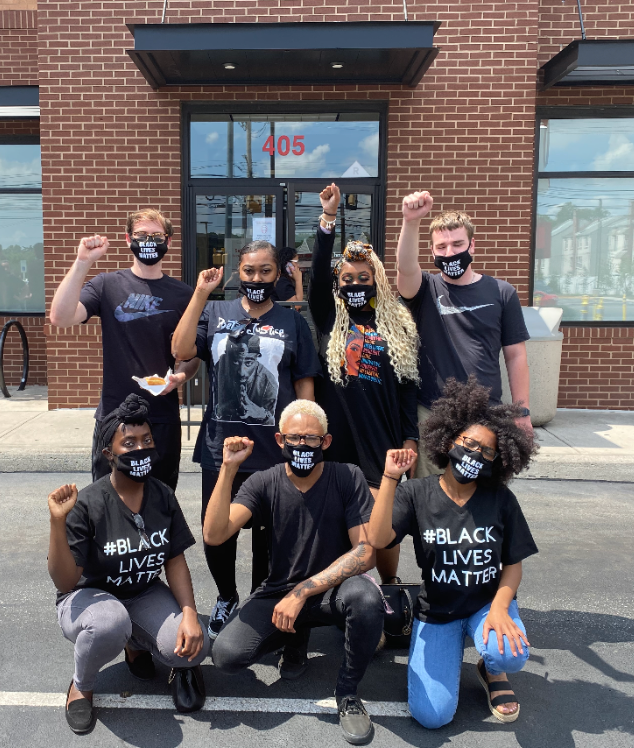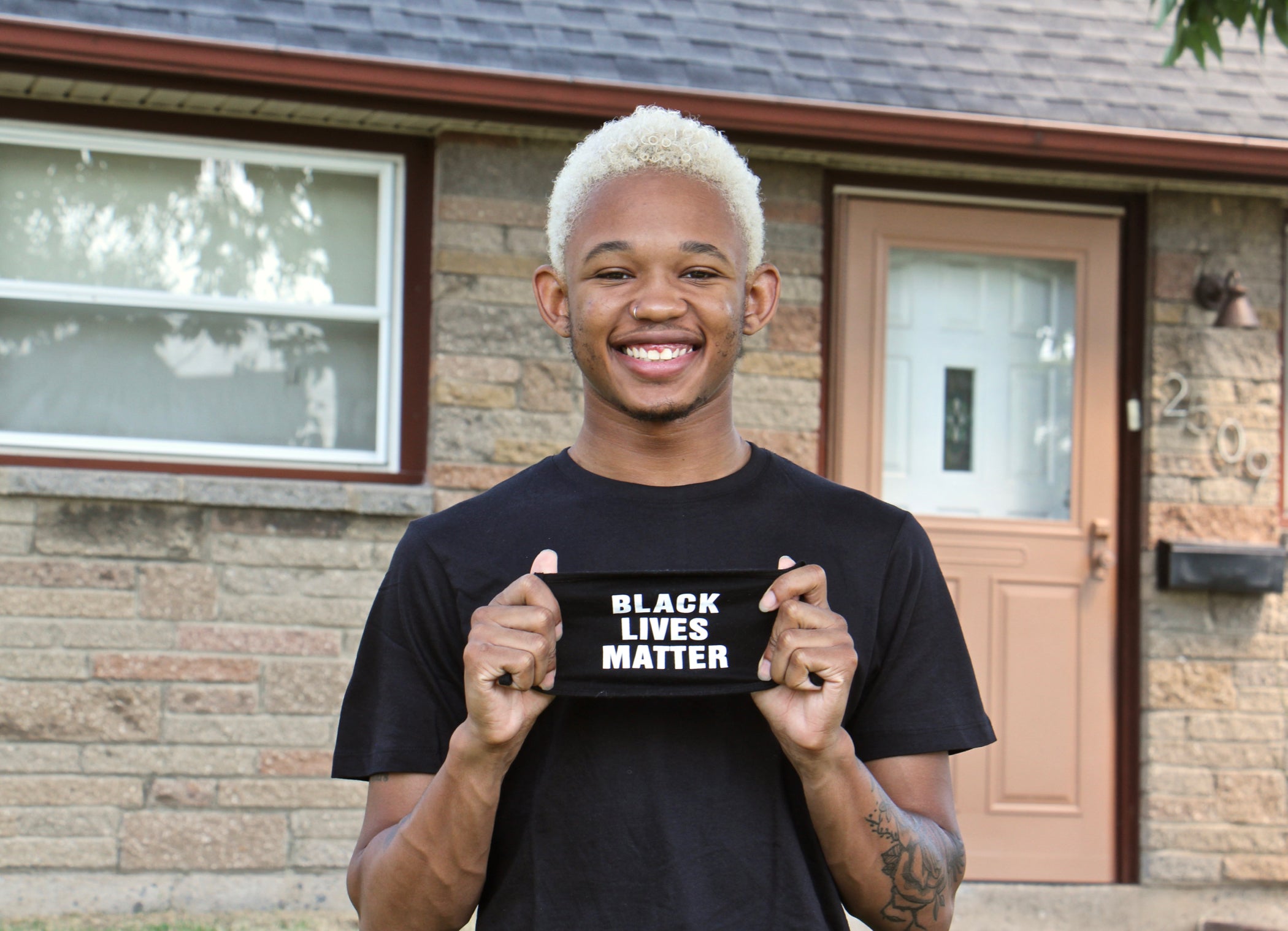
Zaire Cuspud helped lead a worker protest at a pair of Chick-fil-A franchises in Delaware County. (Emma Lee/WHYY)

Zaire Cuspud helped lead a worker protest at a pair of Chick-fil-A franchises in Delaware County. (Emma Lee/WHYY)

Zaire Cuspud helped lead a worker protest at a pair of Chick-fil-A franchises in Delaware County. (Emma Lee/WHYY)
(Media) — Just after noon on Wednesday, June 3, storm clouds gathered along a busy commercial corridor in Ridley Township, Delaware County.
It was no ordinary summer squall.
A violent line of thunderstorms — known as a “derecho” — was about to sweep through the region, ultimately producing 75-mile-per-hour gales, leaving hundreds of thousands without power, and causing at least three deaths.
Inside a Chick-fil-A franchise — wedged between a car-parts store and a pizza joint — employees watched the skies darken and the winds build. As is custom during bad weather, managers called in five employees who’d been outside taking drive-thru orders on iPads and directing traffic.
Then, without explanation, one of the highest-ranking managers on-site ordered a Black male employee into the parking lot.
The employee stood alone outside as the storm approached, waving cars through the narrow lane that circles the store. When other managers spotted a bolt of lightning and asked that the employee be called back inside, Jason Ontjes, the manager who’d made the decision, refused.
“No one cares if [he] dies, right,” said Ontjes, the senior director of operations at the Ridley Chick-Fil-A and another location in nearby Springfield, according to accounts from three employee witnesses.
Standing nearby, Richard Lacontora, director of training at the same pair of Chick-Fil-A franchises, chimed in.
“Yeah, he looks like a protester,” Lacontora said, referring to the thousands who’d filled American streets that week to march against police brutality. “He can be out in the rain.”
The comment drew disgusted looks from surrounding employees.
“And I’m not going to apologize, either,” Lacontora continued, according to the witness accounts. “You guys can’t take a joke.”
Lacontora was right on at least one point: The employees couldn’t take it.
In the aftermath of George Floyd’s death, with the country in upheaval, the employees had reached a tipping point. The exchange sparked a worker rebellion.
Within weeks, Lacontora and Ontjes were forced to resign. Soon after, Chick-fil-A fired two other managers — one Black, one white — who questioned whether the franchise responded swiftly or forcefully enough to the incident.
The uprising was organized and executed by a group of young, Black employees, many of them teenagers. Their demands for racial justice in the workplace did not draw the kind of attention paid to powerful news organizations and high-end restaurants, but they are no less telling.
Even in suburban strip malls — where employees are among the youngest and poorest-paid — whispers of mistreatment have led to calls for action. It’s a reckoning that, in this one specific case, hit an industry long known for toxicity among workers and pushed mistreatment into the light through the ubiquity of social media.
“People can only hear you if you’re talking,” said Zaire Cuspud, 20, one of the employees-turned-organizers. “If you’re not talking about it, no one’s gonna know.”

Chick-fil-A restaurant in Ridley Township, Pa.(Emma Lee/WHYY)
Cuspud was ready to burst well before the incident on June 3.
He was 16 when he first started at the Chick-fil-A location in Ridley — a high school student eager for a paycheck. He enjoyed the job enough to brush off the occasions when he’d hear managers joke about the way Latinx employees spoke English.
“I would feel like it was wrong, but I didn’t really know why,” said Cuspud, who is Black.
When he was 19, he earned a promotion to a position just below the management level, where he idled for almost two years making $11.50 an hour. When a white employee with less seniority, but who had a personal relationship with the store’s general manager, got promoted ahead of him, Cuspud felt deflated. Sometimes, he said, he’d come to work, head to the bathroom and start sobbing.
“There was a time and a period where I thought maybe I’m just not good enough,” said Cuspud.
Informally, he and other Black employees started to talk about the work environment at the Ridley and Springfield Chick-fil-A locations — how they felt Black employees had to work twice as hard for half the recognition. At the Springfield store, according to one employee, 12 of 15 managers were white as of early July, clearly disproportionate to the overall workforce. Keystone Crossroads tried to reach an HR representative to confirm employee demographics, but did not receive a response.
Both stores are owned by Gene Ontjes, Jason Ontjes’ father, one of the first Chick-fil-A franchisees and a personal acquaintance of chain founder S. Truett Cathy.
Black employees also traded anecdotes about racist and sexist barbs they’d overheard in the workplace.
Miatu Kormah, 19, who is Liberian American, recalled a manager speaking to her in a faux “African” accent. Adonia Johnson, 19, bristled at the managers who demanded she change her red hair color because it didn’t look natural, but made no similar request of white employees, she said. Elisha Abney, 21, thought about how Lacontora would interject odd sexual references into normal conversations. And Zayd Blackwell, 23, noted how Lacontora would frequently comment out loud on the physical appearance of female employees and customers.
Abney and the others wondered if all the “little backhanded comments” they’d heard over the years amounted to a real grievance. If they spoke out, would they be dismissed as angry, Black employees, further inhibiting their job prospects?
Then came the “jokes” in the wake of the police killing of George Floyd.
“It’s just like, ‘This is enough,’” said Abney.
On June 9, a core group of employees — five Black and two white — began to organize. They met roughly every other day at Zaire Cuspud’s house. And on June 20, they hand-delivered a four-page letter to the Ridley store while wearing facemasks that read “Black Lives Matter.”
The letter began with the names of Black people killed by police or vigilantes, and a reference to the “provoked uproar” caused by their deaths.
“This revolution has brought the systemic, institutional racism of traumatized Black people — which pervades the structures that govern and rule our citizenry, into the forefront,” the employees wrote. “We are writing this letter to seek resolution to the current issues we have faced here at the Chick-fil-A.”

The employees used social media to quickly amplify their campaign. A letter posted to Adonia Johnson’s Instagram racked up hundreds of likes. (Instagram)
Adonia Johnson posted the letter on Instagram, where it racked up hundreds of likes. An online petition calling for Jason Ontjes and Richard Lacontora to be fired quickly received thousands of signatures. Ontjes and Lacontora did not respond to multiple requests for comment over the course of more than a week.
The digital snowball kept rolling with every post and repost. Soon, new stories emerged from anonymous and named sources alike.
A commenter on the online petition alleged the store had an informal quota for the number of Black employees who could work the register at the same time. Others, claiming to be former employees, said the work environment was “toxic” and fertile ground for sexual harassment.
A Muslim employee, Siani Ross, 18, said that a manager would ask her repeatedly if she celebrates Christmas as a way to needle her. Madison Rivas, a 17-year-old employee who is Mexican and Puerto Rican, alleged that Lacontora once told her to leave the register and clean the dining room because “we like how Latinos clean.” And on another occasion, she said, Lacontora loudly questioned if she was “competent enough” to work after she’d spent two weeks recovering from a suicide attempt.
To some, perhaps, the stories describe behavior and language endemic to the hidden corridors of restaurant culture. But, in this moment, with more workers of color feeling empowered to speak — armed with new terminology to describe racism and online platforms to amplify a message — the treatment could not simply be shrugged away.
“I’m learning that my voice does have an impact,” said Rivas. “One person can inspire so many more people to speak out.”

A core group of seven employees organized and executed a successful campaign to remove two high-ranking managers. (Courtesy of Adonia Johnson)
As the petition gathered signatures and some employees urged a boycott, franchisee Gene Ontjes shut down the Chick-fil-A location in Ridley for two days to hold grievance meetings.
He told the employees that both his son Jason and Richard Lacontora no longer worked for Chick-fil-A. Employees assumed the pair had been fired, but learned two days later, on June 25, it had been asked to resign. Further inflaming tensions, a general manager revealed to several lower-ranking managers that Lacontora hadn’t actually tendered his resignation and was still on the payroll. Keystone Crossroads was not able to confirm this despite repeated requests for comment.
Franchise owner Gene Ontjes said in a statement that he “initiated an investigation” after hearing employee concerns.
“As a result, some leaders are no longer working at the restaurant,” the statement said.
The franchise also updated its employment policies, enrolled all employees in “cultural intelligence training,” and created an “Advisory Review Team” to “ensure that everyone feels comfortable and safe in our workplace,” Ontjes said.
The fact that the franchise reportedly did not fire Ontjes and Lacontora set off more online agitation. Two of the lower-ranking managers — one white and one Black — asked a higher-ranking manager why Ontjes and Lacontora hadn’t been fired. They demanded an audience with owner Gene Ontjes to discuss the issue further.
Instead, General Manager Michael Marino fired the pair, claiming it had threatened and harassed him. Marino did not respond to requests for comment.
Zayd Blackwell, one of the managers fired, worked at the company for more than five years. The single father has since taken a non-management job at a nearby Wawa, where he’s making $5 less an hour.
Blackwell, a college student, hoped to move out of the house he shares with his father and 1 1/2 -year-old daughter. Now, those plans are on hold.
“Life took a little detour,” said Blackwell. “But it’s gonna get back on track.”
Elisha Abney, who has also worked at the chain for five years, said a higher-up inferred to her that she was now unlikely to get a promotion. Other employees involved in organizing or supporting the campaign have either quit already or are looking for work elsewhere.
“I have the courage to move on,” said organizer Adonia Johnson. “But I also have that thing in the back of my mind that’s like, ‘If I do choose to move to another place, is this going to be the same issue I have to deal with?”’
Racism is baked into the structure of the restaurant industry, critics say.
In the era after Reconstruction, restaurant proprietors imported the European concept of tipping, says Saru Jayaraman, president of the activist group One Fair Wage and director of the Food Labor Research Center at the University of California Berkeley. Tips became a replacement for standard wages, and a way to keep formerly enslaved Black people who worked in restaurants trapped in a state of economic dependence.
“It really was slavery that mutated it into a replacement for a wage,” said Jayaraman, who called the service business a “Jim Crow industry.”
The restaurant workforce today is far more racially diverse, but segregation within it has created a racial wage gap. Data shows that people of color are over-represented in low-paying, back-of-house jobs and in fast-food restaurants. Fine dining employees, meanwhile, tend to be overwhelmingly white, according to federal data.
Given its history and power dynamics, allegations of racism and sexism in the fast-food industry are not new, said Georgetown professor Marcia Chatelain, who has written extensively about race and the fast-food industry. Earlier this year, she noted, Black executives sued McDonald’s corporate arm after a round of allegedly discriminatory layoffs.
But employee-management conflicts at the store level tend to be less visible, she said. With the advent of social media, there is now, she believes, a way for smaller skirmishes to reach large audiences.
“These types of workplace concerns and conflicts, I think they have a long history,” said Chatelain. “But our ability to narrate them to a public … I think that’s the new thing.”
Jayaraman hopes this visibility can translate into structural change. She credits the #MeToo movement for provoking an overdue conversation around sexual harassment in restaurants. That conversation, she believes, helped her organization and others introduce legislation to raise wages and target exploitative practices.
“Now what we’re doing is elevating — as hard as we can — the historical racism and ongoing racism in the [restaurant] industry to push that over the victory line,” she said.

“People can only hear you if you’re talking,” Cuspud said. “If you’re not talking about it, no one’s gonna know.” (Emma Lee/WHYY)
The employees who rebelled against their bosses at a pair of suburban Chick-fil-A stores are now part of that fight. They’re also young and headed to new workplaces — carrying with them the lessons from an effective, yet costly, campaign.
Zayd Blackwell, the fired manager and single father, plans to finish his associate’s degree next semester and transfer to a mechanical engineering program at a four-year university. He says he isn’t bitter — just eager to use whatever online sympathy he’s gained to draw more attention to the franchise’s hiring practices.
“I could either be angry or be mad … or I could just think positive,” Blackwell said. “I’m gonna use this platform that I have as a manager who got fired to hopefully bring light to everything that’s happened.”
Zaire Cuspud, one of the lead organizers, also paid a price.
During an employee grievance meeting held in response to the petition, three members of upper management promised him a promotion if he stayed with Chick-fil-A, he claimed. Cuspud wonders now if it was for appearances. When he tried to take them up on the offer, the same higher-ups refused to return his calls, he said.
Cuspud now works at a grocery store chain across the street from his former Chick-fil-A store. He’s also a full-time student at West Chester University, majoring in industrial psychology.
“It’s basically the psychology of the workplace,” he explained.
Cuspud expects he’ll encounter racism in future jobs. He won’t hesitate to call it out when he sees it.
“If I need to be that person,” Cuspud said, “then I will be that person.”
Keystone Crossroads is a statewide reporting collaborative of WITF, WPSU and WESA, led by WHYY. This story originally appeared at https://whyy.org/programs/keystone-crossroads.

A collection of interviews, photos, and music videos, featuring local musicians who have stopped by the WITF performance studio to share a little discussion and sound. Produced by WITF’s Joe Ulrich.
The days of journalism’s one-way street of simply producing stories for the public have long been over. Now, it’s time to find better ways to interact with you and ensure we meet your high standards of what a credible media organization should be.